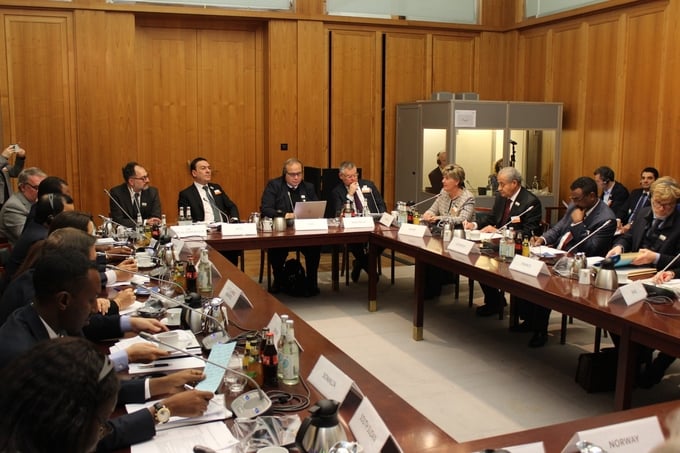May 23, 2025 | 05:21 GMT +7
May 23, 2025 | 05:21 GMT +7
Hotline: 0913.378.918
May 23, 2025 | 05:21 GMT +7
Hotline: 0913.378.918

FAO Chief Economist Máximo Torero moderated a breakout session on “Agrifood systems transformation: a worldwide response to multiple crises”
The Food and Agriculture Organization of the United Nations (FAO) today underlined the crucial importance of concrete measures to accelerate people’s access to healthy diets by transforming agrifood systems to be more resilient, efficient, sustainable and inclusive.
“We need to increase resilience; that means capacity to prevent, capacity to absorb and capacity to build back better," said FAO Chief Economist Máximo Torero, who moderated a breakout session at a ministerial meeting of the Global Forum for Food and Agriculture focused on “Agrifood systems transformation: a worldwide response to multiple crises”.
Among the themes underlined by many countries and organizations in the session was the need for open, transparent and free agrifood markets and trade, critical to address current food security issues.
Another key takeaway was that the challenges of the agriculture sector are similar across the world, including extreme climate events such as floods and droughts, soaring prices for agricultural inputs and the impacts of the COVID-19 pandemic and the war in Ukraine.
Need to boost resilience highlighted
To address these issues, the need to boost the resilience at country level for farmers and especially for smallholder farmers was particularly highlighted, along with the importance of putting agrifood systems centre stage at the upcoming COP28 climate talks. Agriculture contributes to greenhouse gas emissions and at the same time is vulnerable to climate change, hence agrifood systems should be a key topic at the upcoming discussions.
The final GFFA communique highlighted the role of the inter-agency Agricultural Market Information System (AMIS) as well as a number of initiatives in which FAO plays a key role including: the International Treaty on Plant Genetic Resources for Food and Agriculture, the FAO Commission on Genetic Resources for Food and Agriculture , the FAO Framework for Action on Biodiversity for Food and Agriculture, FAO’s work on soil mapping and the establishment of a UN Food Systems Coordination Hub hosted at FAO.
Finance and urban food discussions
Over the three-day GFFA meeting, FAO participated in a High Level Panel and held several expert panels including: Financing sustainable transformation in the agrifood systems: Gaps and opportunities. This event highlighted the fact that agriculture and land use received only 26 per cent of the global climate finance flows to all sectors between 2000 and 2018. In this context, a boost in investment is essential to transform the world’s agrifood systems, while supporting countries’ access to climate finance and ensuring that appropriate financial resoures reach small and medium-scale food producers.
Leveraging urban and local food systems for sustainable food systems transformation. Urbanization, along with climate change and technological progress, is contributing to a sea change in the way we produce and consume our food, meaning cities and local governments need greater support in helping build a sustainable agrifood systems transformation. With 70 percent of global food consumed in urban areas, the event focused on innovative ways to strengthen the role and function of urban and local food systems. The FAO flagship report on the State of Food Security and Nutrition in the World 2023, to be launched in July, will address the same issue.
At the GFFA Innovation Forum, FAO presented the Organization’s efforts to help strengthen the link between science, research and development, and facilitate the development and scaling up of innovation processes (such as Codex Alimentarius, Farmer Field Schools, and the Hand-in-Hand geospatial platform).
Further innovative tools include WaPOR to monitor agricultural water productivity through satellite data, eLocust3 – an innovative early warning tool for possible locust outbreaks –, and the Digital Village Initiative. FAO’s Office of Climate Change, Biodiversity and Environment also presented projects on accelerating action towards climate-friendly agrifood systems.
(FAO.org)

(VAN) Alt Carbon has raised $12 million in a seed round as it plans to scale its carbon dioxide removal work in the South Asian nation.

(VAN) Attempts to bring down the price of the Japanese staple have had little effect amid a cost-of-living crisis.

(VAN) Fourth most important food crop in peril as Latin America and Caribbean suffer from slow-onset climate disaster.

(VAN) Shifting market dynamics and the noise around new legislation has propelled Trouw Nutrition’s research around early life nutrition in poultry. Today, it continues to be a key area of research.

(VAN) India is concerned about its food security and the livelihoods of its farmers if more US food imports are allowed.

(VAN) FAO's Director-General emphasises the need to work together to transform agrifood systems.

(VAN) Europe is facing its worst outbreak of foot-and-mouth since the start of the century.